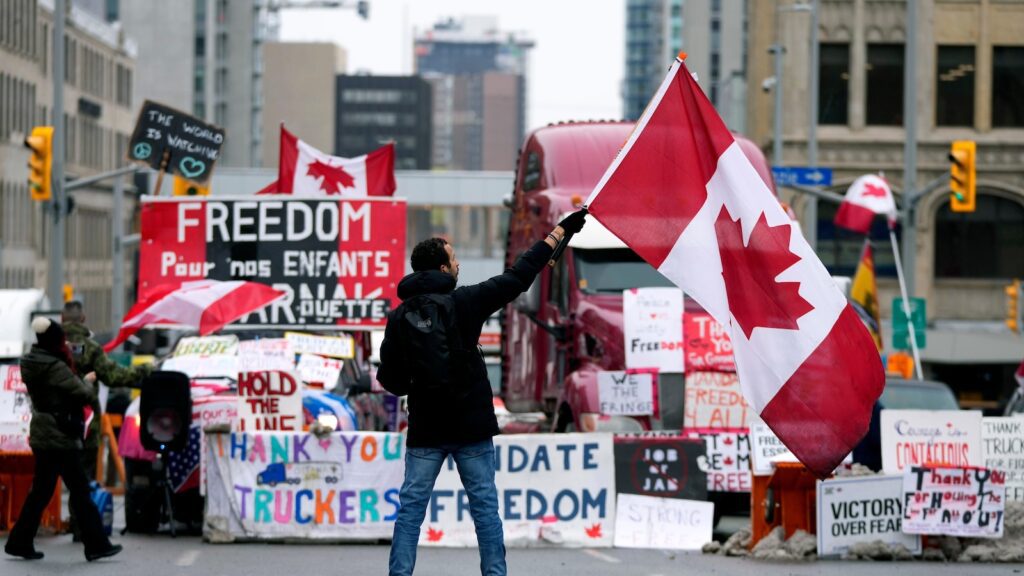In a ruling set to reverberate across Canada and beyond, a Canadian Federal Court has declared the government’s imposition of the Emergencies Act during the weeks-long protests triggered by COVID-19 restrictions in 2022 as both unreasonable and unconstitutional. The judgement raises important questions about the balance between civil liberties and extraordinary powers invoked in the name of emergency response, holding a mirror to a dramatic period in Canada’s recent history and potentially reshaping its future legal landscape.
Thousands of protestors, converging under the banner of the self-dubbed Freedom Convoy, paralyzed the city of Ottawa for weeks, their ire largely directed at mandatory vaccine protocols for truckers, as well as wider COVID-19 measures enforced by Prime Minister Justin Trudeau’s Liberal government. Transcending the borders of Ottawa, similar protests disrupted vital international border crossings, the most notable being the blockade at Coutts, Alberta, parallel to Montana, where 11 arrests were made following the discovery of a cache of guns and ammunition.
Ep. 68 Whatever happened to the truckers who dared to protest Justin Trudeau? Some of them are still in jail, years later. Trucker Gord Magill explains how darkness has descended on Canada. pic.twitter.com/pmj6Quq4Sp
— Tucker Carlson (@TuckerCarlson) January 24, 2024
By invoking the Emergencies Act, an unprecedented step, the government greatly expanded its authority. It deemed areas off-limits, froze personal and corporate bank accounts of truckers, and had the power to force towing companies to remove vehicles blockading vital routes.
Federal Court Justice Richard Mosley, in the judgement released on Tuesday, was emphatic and explicit in his ruling, stating that the invocation of the Emergencies Act culminated in the violation of constitutional rights. “There was no national emergency justifying the invocation of the Emergencies Act and the decision to do so was thus unreasonable,” he wrote.
Notwithstanding the ruling, Deputy Prime Minister Chrystia Freeland reiterated the government’s position, announcing plans for an appeal. Freeland, though acknowledging the gravity of the decision to invoke the act, maintained that the protests constituted a significant risk to public safety, national security and crucially, Canada’s economic stability.
The Canadian Civil Liberties Association, accompanied by other individual and group litigants, successfully contended that the Trudeau government rushed into emergency measures without providing adequate justification. While the government defended its actions, insisting they were targeted, proportionate, and compliant with Canada’s Charter of Rights and Freedoms, the court ruled otherwise.
Adding a twist to this affair, a public commission—steered independently by another judge—had earlier deduced that the majority of emergency measures were, in fact, justifiable.
Originally protesting the vaccine mandate for cross-border truckers, the Freedom Convoy quickly broadened its remit to encompass a broader frustration over COVID-19 measures and antagonism towards Trudeau, thereby underscoring the wider societal malaise and spread of radical right-wing sentiments in Canada. The fallout shook Canada’s reputation for peaceful dissent, inspired similar movements internationally, and temporarily stalled economic trade, with the blockage of the Windsor-Detroit crossing, which accounts for over 25% of US-Canada trade, causing the most disruption.
In conclusion, this verdict is a significant development, not only for its immediate constitutional implications but also for its potential longer-term effects on Canadian society and the government’s ability to push back on public protest. While it is almost certain the government will appeal, this decision stands as a legal reproach to the expansion of governmental powers in the age of the pandemic. The search for a balance between individual liberties and public safety continues, a task only made more complex in these extraordinary times. Beyond its borders, Canada’s experience and reactions will continue to shape international dialogue and understanding of civil liberties, social resistance, and governmental control.



